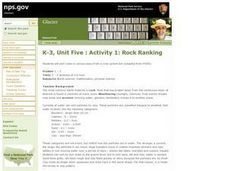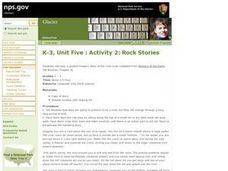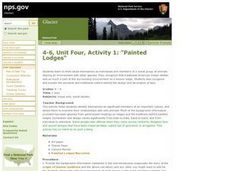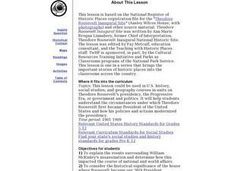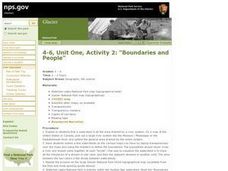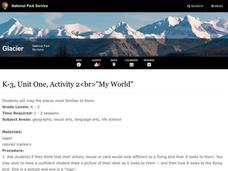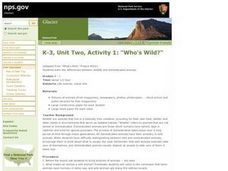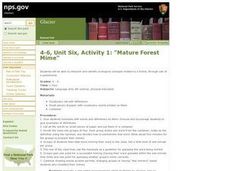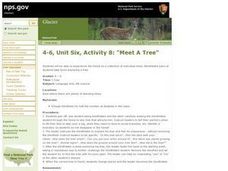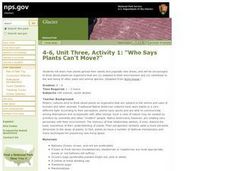Curated OER
The Web of Life
Students demonstrate the interrelationships of animals and plants. In this ecology lesson, students discuss the things plants and animals need for survival and study the glacier food chain. Students simulate the web of life by using a...
National Park Service
Rock Ranking
Junior geologists sort rocks and soil. They separate a sample of river gravel by size, shape, color, and other characteristics. To include Common Core standards, you could have little ones graph the number of particles in each sample.
Curated OER
Rock Stories
Youngsters pretend they are rocks sitting on a hill. They listen to the provided guided imagery script to conceptualize the process of how rocks change over time. They draw a diagram of what happened to them as rocks during the story. An...
Curated OER
Painted Lodges
Students explore lodge construction as a representation of culture. In this cultural diversity and Native American history lesson, students listen to a narrative explaining the origin of Native American painted lodges. Students design...
Curated OER
Visual Vocabulary
Students interpret and name the vocabulary termed acted out by the mime. In this science/language arts/physical education lesson, students are given a set of vocabulary terms to discuss within their group. Next, students place all...
National Park Service
The Secret of Life
Dead trees provide nutrients for the soil, food for animals, protection and a home for organisms, a seed-bed for new trees, and a place for nitrogen-fixing bacteria to live. In the activity, pupils collect decaying logs, expose them to a...
National Park Service
Subalpine Web
The theory of keystone species in an ecosystem was first established in 1969 by Robert T. Paine. Pupils open the final lesson in a five-part series with a game guessing which member of the alpine ecosystem they are based on clues. After...
National Park Service
Leave it to Beavers
Many people know cats mark their territories by rubbing the back of their necks to leave a scent, but not many people know beavers also leave a scent to mark their territories. During the first activity of two, scholars use their noses...
Curated OER
Ansley Wilcox House
Students complete activities that go along with the study of and possible fieldtrip to the Ansley Wilcox House (T. Roosevelt Inaugural National Historic Site) in Buffalo, NY. They trace the background of a historical building in their...
Curated OER
People of the West
Sixth graders research and identify key facts about men and women of the Westward Movement. They assess the events and reasons that motivated people to move west, hardships they faced and their contributions to the nation. Each student...
Curated OER
Boundaries and People
Students map watersheds to find their boundaries. In this watershed activity students map and then give their "watershed address." Students show the trail from stream, larger stream to oceans. Students describe the boundaries of the...
Curated OER
Forest Communities
Students identify tree specimens. In this tree specimens lesson plan, students collect different parts of a tree from the areas around the school or their home. They then work in groups to create booklet that identifies tree specimens.
Curated OER
Village Research
Sixth graders research global warming. In this science lesson, 6th graders collect data in the Waterton Townsite, Apgar Village and St. Mary area. Students interpret the data and form a hypothesis about global warming.
Curated OER
My World
Students study maps. In this social studies lesson, students draw a map of either their room at home or the route they take to school. Students label items on their maps.
Curated OER
Garbage in the Garden
Students create their own compost. In this soil lesson, students fill a bag with waste and soil, in order to create a mini compost bin. Students observe the baggies over a 6 week period, they record their findings and collect data on...
Curated OER
Tracks along the Trail
Students identify animal tracks outdoors. In this animal life lesson plan, students go outdoors and find several different animal tracks to identify. Students also discuss how animals must adapt in the winter months.
Curated OER
Puzzle it Out
Students study the Earth's climatic system and construct a puzzle that names all of the pieces of the components involved. In this Climate lesson, students draw a picture on a puzzle piece depicting a specific component. Students then...
Curated OER
Who's Wild?
Students explore the differences between animals of the wild and domesticated animals. In this wild animals instructional activity, students understand that tame animals ancestors were once wild. Students illustrate the differences by...
Curated OER
Mature Forest Mime
Students come to understand vocabulary words through pantomime. In this vocabulary lesson, students first review several vocabulary words and their meaning, then they work in groups to pantomime the definitions.
Curated OER
Meet A Tree
Students explore different types of trees with their senses. In this nature lesson, students play a game in which pairs use their senses to explore trees, blindfolded. Students then must find the tree they found when blindfolded.
Curated OER
Worksheet 19 - Topographical Maps
In this map worksheet, students use information from given topical maps and locate the maxima and solve one dimensional wave equations. This two-page worksheet contains four problems.
Curated OER
Seepy Sandwich
Students study how water infiltration can carry pollution underground. In this water infiltration activity, students conduct an experiment on water infiltration and underground pollution.
Curated OER
The Big Circle
Pupils explore geography by participating in a mapping activity. In this concentric ring lesson, students utilize a poster board, string and markers to identify their current location within the entire world. Pupils write about their...
Curated OER
Who Says Plants Can't Move?
Students discover how plants spread their seeds using other plants and animals. In this plant lesson, students role play different plants and how their seeds travel. Students then have a class discussion to ensure their understanding.



